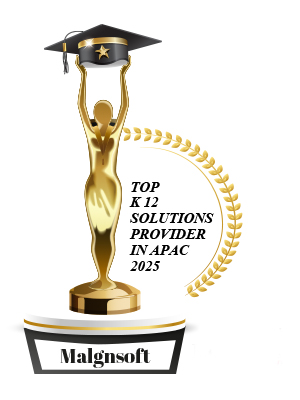THANK YOU FOR SUBSCRIBING
Be first to read the latest tech news, Industry Leader's Insights, and CIO interviews of medium and large enterprises exclusively from Education Technology Insights
On-premises or cloud-based LMS? When organizations embark on launching an e-learning program, they face this pivotal decision. The choice usually hinges on the three C’s—cost, control and customization—but it often feels like a trade-off rather than a balanced decision that aligns with all the needs. An on-premises LMS offers full control and deep customization, yet the burden of high infrastructure costs and constant maintenance can weigh organizations down. Meanwhile, a cloud-based LMS offers affordability and ease of deployment but often demands sacrifices—limited customization, rigid structures and reliance on provider-controlled updates. Malgnsoft’s LMS is breaking the trade-off. The solution is designed to eliminate the traditional limitations of cloud platforms. Malgnsoft’s LMS combines cloud accessibility with on-premises-level customization but without the high operational costs. At the heart of this flexibility is Malgn-Framework, Malgnsoft’s proprietary development framework built on JavaServer Pages (JSP). This technology allows the company to customize its LMS dynamically, embedding Java code directly into HTML to tailor learning paths, manage user access and integrate third-party tools seamlessly. And since new features are added regularly, organizations don’t have to wait months for updates and can continue improving their platforms without disruptions. With Malgnsoft’s LMS, businesses no longer have to compromise between control and convenience. It’s a cloud LMS that adapts to the organization’s needs, not the other way around. “A fully integrated e-learning ecosystem—that’s what Malgsoft’s LMS is about,” says Keunho Ha, CEO. “Whether for academic institutions or professional development programs, we empower everyone with the precise functionality they need while maintaining agility for future growth.” For public institutions, security is a decisive factor in LMS selection. Malgnsoft’s Public Institution Cloud LMS is tailored to meet the public sector’s stringent security and compliance requirements. It is the only LMS in Korea certified with the Cloud Security Assurance Program (CSAP), a crucial certification for public institutions. Enterprise-grade security measures, including end-to-end encryption, multi-factor authentication and audit trails, further assure sensitive data is always protected.
Top Higher Education AI Company in APAC 2025
Ellucian is shaping the future of education with technology. As a global leader, it drives innovation in higher education by merging decades of expertise with groundbreaking technology to transform campus operations. Committed to student success and institutional efficiency, Ellucian delivers cutting-edge digital solutions that enhance learning, streamline operations, and fuel digital transformation. Its cloud-based solutions address higher education’s unique challenges. Its portfolio includes ERP, SIS, and CRM systems for seamless campus-wide integration. Enhanced offerings like Ellucian Experience, a role-based dashboard, and Ellucian Ethos, which connects applications and processes, boost efficiency. Cloud native automation tools like Ellucian Workflow streamline administrative tasks, allowing institutions to focus on student success. Cloud-native platforms keep institutions agile, streamlining operations while boosting security and scalability. With advanced analytics and automation, Ellucian delivers insights that drive student success and institutional growth. Strategic alliances with top academic institutions and partners like Transact Campus for SaaS payment solutions cement its leadership in education technology. Recognizing the need for continuous evolution, Ellucian invests in AI and machine learning to boost student engagement, and optimize academic advising. AI-driven tools provide deep insights into student behavior, enabling personalized interventions that improve retention and graduation rates, fostering a proactive academic environment. Financial management solutions automate budgeting, financial aid processing, and procurement, ensuring efficiency and compliance. Integrated finance and human resources management optimize resource allocation and financial planning. Reporting and analytics solutions offer real-time insights into institutional performance, student success metrics, and operational efficiency. Advanced dashboards and predictive analytics enable data-driven decisions that enhance engagement, retention, and graduation rates.
Comprehensive Learning Management System in APAC 2025
Education has always been a collective journey—one where teachers, students and technology must move forward together. But for too long, technology and learning operated in silos, missing the opportunity to amplify one another’s impact. Anthology saw a different path. It believed in the ‘power of together’—the idea that when education and technology work in harmony, they unlock new possibilities for student engagement, personalized learning and administrative efficiency. With three specialized solutions— Blackboard, Student and Reach—it creates a holistic ecosystem to ease educators’ burdens and inspire students to achieve their full potential. Gone are the days of chalk dust and static lessons. The traditional blackboard once confined teaching to words and diagrams, but Anthology’s Blackboard reshapes classrooms into dynamic, interactive spaces. Its cloud-based learning management system (LMS), powered by AI-driven tools, elevates both teaching and learning experiences. Blackboard enriches learning through multimedia elements, weaving videos, interactive quizzes and digital resources into the curriculum to create immersive experiences. Its automated grading system streamlines assessments and provides educators with real-time insights into student performance, allowing for timely interventions and support. “This is a significant step toward realizing an inclusive and equitable education system that empowers learners irrespective of their geographic constraints. Technology’s influence on education will not only enhance the learning journey but equip future generations with the skills they need to navigate an increasingly digital world,” Bruce Dahlgren, CEO. The impact of this transformation is already visible in institutions like Grand Valley State University (GVSU). Following the pandemic, GVSU faced declining enrollment as students prioritized digital access and flexibility. Recognizing this shift, the university embarked on a mission to modernize online learning, engage faculty in digital instruction and build a lasting, student-centric education model. With Blackboard, instructors could track student performance in real time, leveraging built in insights to identify at-risk learners and connect with them through integrated communication tools. Mobile-friendly access, automated grading and data-driven support empowered faculty to create a more inclusive and responsive learning experience.
CXO INSIGHTS

Equipping Educators and Students for an AI-First World
Michael Sankey, Adjunct Professor, Charles Darwin University

AI Education for K-12 Schools: Preparing Students for the Future
Yu Lu, Associate Professor, Director of Artificial Intelligence Lab, Beijing Normal University and A

Rethinking STEM: Where Humanity Meets Innovation
Mr. William Robert D. Silva, Science Teacher, Ateneo de Manila University

AI in Education: A Fresh Perspective on Transformative Potential
By Dr. Rolly Alfonso-Maiquez, Director of Educational Technology & Innovation and Data Protection Of

Leadership in Education
Andrew Pearson, Senior Lecturer and Program Director, Griffith University

Knowledge Construction: Impact of AI in Higher Education Teaching and Learning
Zahiruddin Fitri Abu Hassan, Senior Lecturer, University of Malaya

The Power of 5E: Fostering Holistic Growth and Transformative Citizenship
Dr. Renierio E. Aligonero, Subject Area Head, Social Living and Global Education (SLGE) and PhD Mana
IN FOCUS
The Power of LMS in K-12 Schools in APAC
The APAC K-12 education sector rapidly evolves through LMS adoption. LMS enhances personalized learning, collaboration, and data-driven insights while enabling flexible, tech-integrated, and equitable digital education across diverse contexts. The education landscape in the Asia-Pacific (APAC) region is undergoing a significant transformation, driven by rapid technological advancements and a growing emphasis on digital learning. At the heart of this evolution lies the Learning Management System (LMS), a robust platform redefining how teaching and learning occur in K-12 schools. Key Benefits of Implementing an LMS in K-12 Schools Integrating an LMS into the K–12 education ecosystem benefits all stakeholders, including students, teachers, parents, and administrators. This ensures equitable, on-demand access to educational materials, allowing teachers to share resources such as videos, external links, and digital textbooks. It streamlines content delivery while reducing relianc
Redefining K-12 Education in APAC
The K-12 education sector in the Asia-Pacific (APAC) region is driven by innovative solutions encompassing diverse technological tools, digital content, and pedagogical support systems, fundamentally altering the learning delivery method and experience for millions of students. The region is witnessing the development of an ecosystem of providers addressing varied educational needs across multiple economies, facilitating a pivotal shift from traditional paradigms to modern, technology-enabled learning environments. This evolution reflects a strong momentum towards digitalization, personalization, and readiness for the future of education. A primary driver is the ambitious digital transformation agendas led by governments across various countries. These often involve significant public investment in educational technology infrastructure, national digital learning platforms, and policies to integrate technology into curricula. In parallel, the increasing prevalence of internet connect
EDITORIAL
Smart Tools for Smarter Learning
This wave of innovation goes beyond personalization, fundamentally changing how knowledge is experienced. Immersive technologies, including augmented reality (AR), virtual reality (VR) and mixed reality (MR), are transforming lessons into fully interactive, simulation-based learning experiences. At the same time, modern Learning Management Systems (LMS) are evolving from basic content repositories into dynamic, AI-enabled platforms. With integrated analytics, mobile compatibility, and real-time collaboration tools, these comprehensive LMS solutions are enabling schools, universities, and training institutions to deliver flexible, scalable, and outcome-focused education. Together, these advancements are not just modernizing education across the Asia-Pacific region. They are building a more responsive, learner-centric future.
Driven by these trends, the global EdTech market is projected to reach approximately USD 187.02 billion in 2025, growing at a compound annual growth rate (CAGR) of 13.3 percent from 2025 to 2030.
The Education Technology Insights APAC, features articles by Yu Lu, Associate Professor and Director of the AI Lab, and Abbas Wahab, a Doctoral Student at Beijing Normal University, which stresses the urgent need for AI education in K-12 schools to equip students for a technology-driven future. Another feature of Avelino Ignacio Jr., Head, Research Program Component of Research Management Office at Bulacan State University, discusses the benefits of Inquiry-Based Learning (IBL) and scaffolding, which help students build critical thinking, problem-solving skills, and independence through structured support.
This edition features the Top K-12 Solutions Provider in APAC 2025, the Top Higher Education AI Company in APAC 2025, and the Comprehensive Learning Management System in APAC 2025. We hope you find the right partner to meet your organization’s needs.
I agree We use cookies on this website to enhance your user experience. By clicking any link on this page you are giving your consent for us to set cookies. More info

However, if you would like to share the information in this article, you may use the link below:
www.educationtechnologyinsightsapac.com/edition/june-2025-12.html










